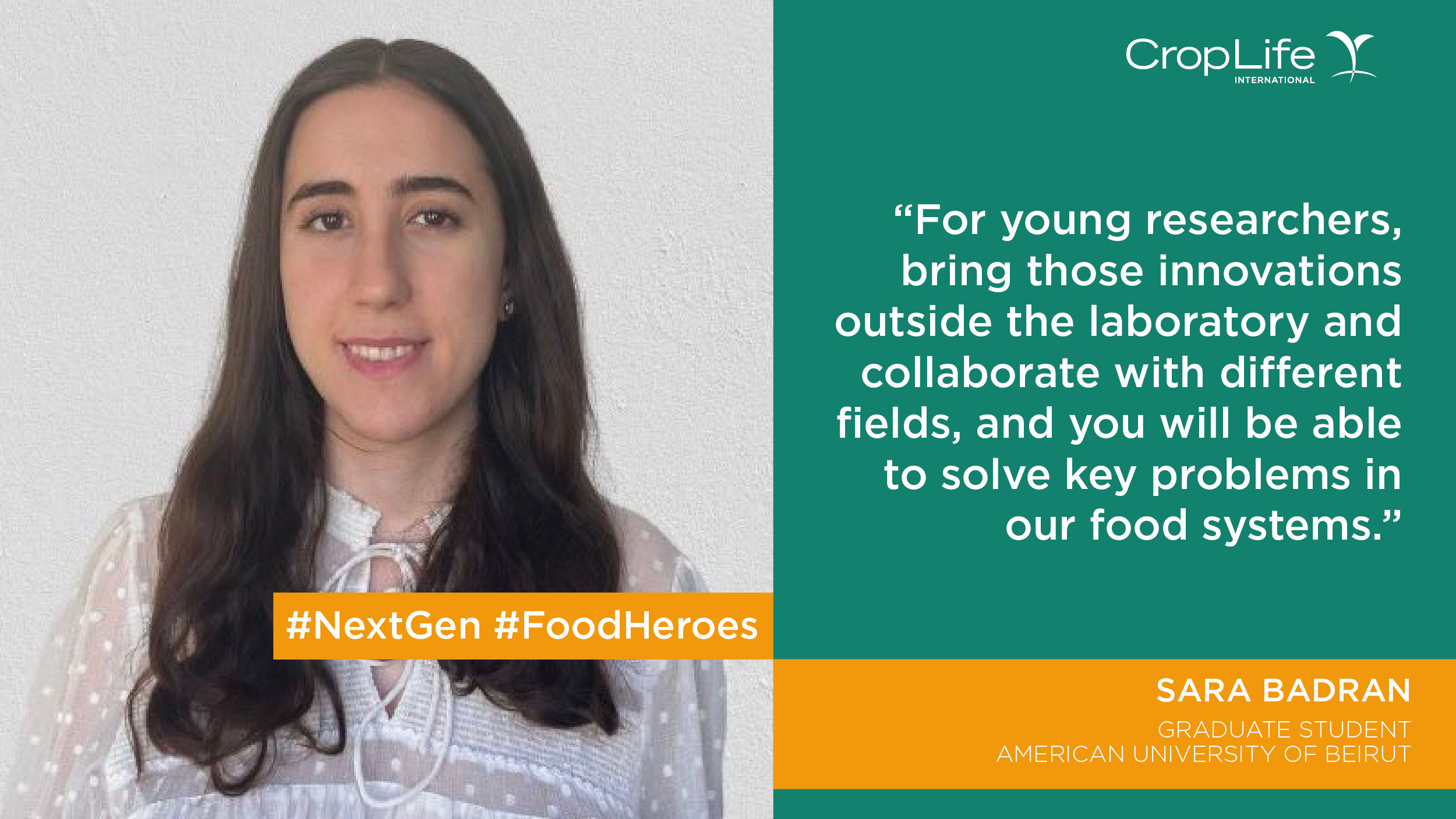
Sara is a graduate student majoring in Environmental Sciences at the American University of Beirut, currently working on two research projects. The first aims to create a smart temperature-memory material that can inform consumers about the exact exposure time and the highest temperature to which the product was exposed. She and her team are validating this research project on dairy products. She’s also continuing to work on her thesis, on circular economy potential in waste reuse and preparation for reuse, where data is collected through machine learning techniques via social media data mining.
Tell us a bit about your career. What do you love about your studies and how did you get here?
During my undergraduate degree in Food Science and Management, I worked as a research assistant for a project entitled “Analysis of organic schemes in Lebanon and the implication on sustainable agriculture,” in addition to other research projects related to future food trends, such as exploring the possible incorporation of seaweed in food and a shelf life/quality preservation research project in collaboration with Texas A&M University.
I love that I am studying a field that is very well needed today, especially with climate change being rapid, intensified, and widespread. I also love that I can apply my academic and technical background in my professional career. I started as an ambassador with Thought for Food, which empowered me to work on local initiatives in Lebanon over the past year. Additionally, through my participation in various hackathons and accelerator programs, I discovered my passion for innovation and entrepreneurship. Currently, I serve as the MENA regional coordinator at TFF. Through this role, I organized and executed events related to important topics ranging from Food Waste and Loss to Agri-Food Innovation potential in MENA. I am happy to be able to highlight some of the key challenges faced in my region, all while supporting and empowering a team of seven young ambassadors, reaching out to potential partners, and keeping a record of our regional database. I also gained exposure to multiple experts and entrepreneurs and learned how food insecurity is aggravated today.
 What advice would you share with young people who hope to contribute to sustainable food systems and farming?
What advice would you share with young people who hope to contribute to sustainable food systems and farming?
One piece of advice that I personally felt helped me in my education and career in food systems is: always take part in initiatives. Go beyond your comfort zone, apply to those competitions, and collaborate with other young innovators and policymakers. Through collaboration, you can contribute to sustainable food systems and farming. For young researchers, bring those innovations outside the laboratory and collaborate with different fields, and you will be able to solve key problems in our food systems.
Also, whenever you have the chance, ask the older generation around you how they used to farm. You will learn a lot about sustainable and valuable practices that we have lost with our current lifestyle.
Finally, everything can start with minor changes, so look at your diet and local food systems. That is where it all starts and how you will learn to contribute, intervene, and provide tailored solutions.
How does agriculture need to change to be more sustainable?
Agriculture today needs to be localized. Living in Lebanon, we face the impacts of inflation on food insecurity due to the current economic crisis, aggravated by the lack of local food manufacturing and production. While I am facing those challenges locally, I am aware that, with the increase in natural and human-made hazards due to climate change and conflicts around the world, many of us are at major risk of not having access to safe, affordable, and available food. That impacts economic activity and disrupts market access while often affecting smallholder farmers more acutely.
Communities should be able today to take control of their food by decentralizing food production.
How can science and innovation help promote sustainability in food and agriculture?
Innovation and science in the agri-food sector can positively contribute to the various environmental challenges and promote sustainability. Science and innovation can ensure both safety and availability of food. For example, new agricultural technologies can provide constant access to food where it is consumed.
Although sustainability is a challenge, it can be met with innovation. One aspect could be better data gathering. Data availability and accessibility will make not only the life of scientists easier but also policymakers and business owners. For example, incorporating artificial intelligence, machine learning, and the Internet of Things can automate agriculture technologies while contributing to the missing data.
 In what ways are you leveraging innovation to promote robust food systems? Can you provide specific examples of innovation/technologies that support your work in tangible ways?
In what ways are you leveraging innovation to promote robust food systems? Can you provide specific examples of innovation/technologies that support your work in tangible ways?
New agri-food technologies can feed everyone, everywhere, every day, with nutritious food. I am interested in alternative protein innovations such as seaweed and insect farming to tackle food insecurity. Operations can be established at a low cost while providing a healthy and all-year protein supply of nutritious food for humans and livestock. They can also open opportunities for climate-resilient jobs for women and youth in locations with limited resources. Additionally, those two innovations can be established in arid areas and cities while conserving biodiversity.
One project I am currently working on, in partnership with Act4Food Act4Change, is to build self-reliant systems in conflict areas. More precisely, we aim to introduce hydroponic farms to refugee camps in Lebanon while empowering this community to support their nutritional needs.
How do you see next-generation agricultural technologies contributing to solutions to biodiversity, climate change, food loss and waste challenges?
Next-generation agricultural technologies can contribute to diverse topics. As such, crop biotechnology can positively address climate change while improving global food security and reducing the environmental impacts of agriculture. Crop biotechnology can address both mitigation and adaptation to environmental changes. Biotechnology can reduce greenhouse gas emissions, reduce food waste, and preserve food longer. One example could be drought-tolerant crops.
Anything else you would like to share?
With TFF, I joined the Food for Future Summit at Expo Dubai as a speaker in February to talk about the role of youth in creating solutions and innovations when addressing climate change.
Sara is just one of many inspirational young people working in agriculture. Visit our NextGen #FoodHeroes page to hear from other next-gen innovators working to improve plant science and nutrition.



